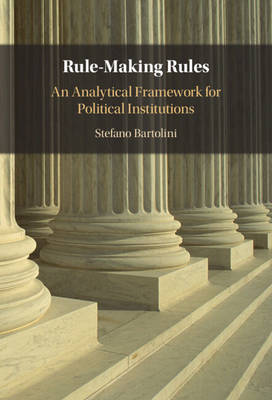
- Afhalen na 1 uur in een winkel met voorraad
- Gratis thuislevering in België vanaf € 30
- Ruim aanbod met 7 miljoen producten
- Afhalen na 1 uur in een winkel met voorraad
- Gratis thuislevering in België vanaf € 30
- Ruim aanbod met 7 miljoen producten
Zoeken
Rule-Making Rules
An Analytical Framework for Political Institutions
Stefano Bartolini
Hardcover | Engels
€ 158,95
+ 317 punten
Omschrijving
Stefano Bartolini argues that, despite the growth of a large theoretical literature about institutions and institutionalism over the last thirty years, the specific nature of political institutions has been relatively neglected. Political institutions have been subsumed into the broader problems of the emergence, persistence, change and functions of all types of institutions. The author defines political institutions strictly as norms and rules of 'conferral', to be distinguished from norms/rules of 'conduct' and of 'recognition'. They are those norms and rules that empower rulers, set limits to the capacity to ensure behavioural compliance, and define the proper means for achieving such compliance. This book draws logical and empirical consequences from this understanding, to distinguish different types of norms/rules, and to specify the peculiarities of those norms/rules that are 'political'. The book will appeal to researchers of political institutions in comparative politics, and in political science and political sociology more broadly.
Specificaties
Betrokkenen
- Auteur(s):
- Uitgeverij:
Inhoud
- Aantal bladzijden:
- 300
- Taal:
- Engels
Eigenschappen
- Productcode (EAN):
- 9781009206273
- Verschijningsdatum:
- 30/06/2022
- Uitvoering:
- Hardcover
- Formaat:
- Genaaid
- Afmetingen:
- 152 mm x 229 mm
- Gewicht:
- 589 g

Alleen bij Standaard Boekhandel
+ 317 punten op je klantenkaart van Standaard Boekhandel
Beoordelingen
We publiceren alleen reviews die voldoen aan de voorwaarden voor reviews. Bekijk onze voorwaarden voor reviews.











